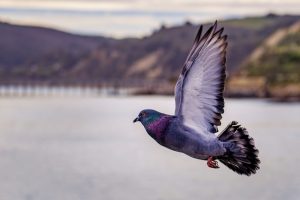Pigeons, those ubiquitous birds found in urban and rural environments, are often overlooked but are fascinating creatures. Understanding their lifespan can provide valuable insights for bird enthusiasts, researchers, and those who encounter these birds daily.
Average Lifespan of Pigeons
Pigeons are common sights in urban and rural areas. Understanding their lifespan offers insights into their lives. This chapter explores the factors affecting how long pigeons live, from wild to domestic environments.
Wild Pigeons
In their natural habitat, wild pigeons typically have a shorter lifespan, averaging around 3 to 5 years. This is due to the numerous challenges they face, including predation by cats, hawks, and other birds of prey. Additionally, exposure to diseases and competition for food can significantly impact their longevity.
Domestic Pigeons
Pigeons kept in captivity, often referred to as domestic pigeons or fancy pigeons, generally live longer lives. With proper care and a protected environment, they can reach an average lifespan of 10 to 15 years. Some exceptionally well-cared-for birds have even been known to live beyond 20 years.

Factors Influencing Pigeon Lifespan
Several factors contribute to the lifespan of pigeons:
- Diet and Nutrition. A balanced diet rich in essential nutrients is crucial for a pigeon’s health. Lack of proper nutrition can lead to weakened immune systems and increased susceptibility to diseases.
- Environmental Conditions. Safe and clean living conditions are essential. Exposure to harsh weather, pollutants, and overcrowding can negatively impact a pigeon’s lifespan.
- Healthcare and Veterinary Care. Regular check-ups by a qualified avian veterinarian can help identify and address health issues early on.
Common Health Problems Affecting Pigeons
Pigeons, like any other animal, are prone to various health problems. Some of the most common include:
- Pigeon paramyxovirus, coccidiosis, and trichomoniasis are among the diseases that can affect pigeons.
- External parasites like mites and lice, as well as internal parasites, can cause discomfort and health issues.
- Collisions with buildings, attacks by predators, and accidents can result in injuries that may shorten a pigeon’s lifespan.

Improving Pigeon Lifespan
To enhance the lifespan of pigeons, whether wild or domestic, several steps can be taken. Proper care practices are crucial, starting with providing a balanced diet, ensuring access to clean water, and maintaining a safe living environment.
Regular cleaning and disinfection of cages or lofts are essential for preventing the spread of diseases and ensuring the pigeons’ well-being. Additionally, preventative measures play a significant role in extending their lifespan.
Vaccinations against common diseases and regular deworming can help shield pigeons from health threats, contributing to their overall longevity and quality of life. By focusing on these aspects, you can significantly improve the health and lifespan of pigeons.

The lifespan of a pigeon can vary significantly depending on various factors. While wild pigeons face numerous challenges that shorten their lives, domestic pigeons can enjoy longer and healthier lives with proper care. By understanding the factors influencing pigeon lifespan and implementing appropriate care practices, individuals can contribute to the well-being of these fascinating birds.
By taking steps to protect and care for pigeons, we can help ensure that these common yet remarkable creatures thrive in our shared environment.




